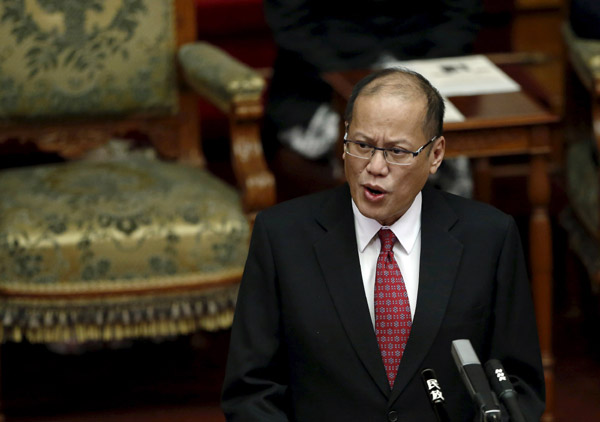Aquino, Abe never to score 'A' on history test
Updated: 2015-06-04 09:26
(Xinhua)
|
|||||||||||
 |
|
Philippines' President Benigno Aquino delivers a speech at the Upper House of parliament in Tokyo, Japan, June 3, 2015. [Photo/Agencies] |
TOKYO - Philippine President Benigno Aquino in Tokyo on Wednesday spouted again his ignorant metaphor -- likening China to Nazi Germany -- on the South China Sea issue and tried again to drag Japan and tow the United States towards further meddling in the region.
Answering a question on the South China Sea issue after addressing Japanese business leaders, Aquino said that although he is "an amateur student of history" , he is reminded of how Nazi Germany annexed Sudetenland and Czechoslovakia before World War II and other European powers' response.
"If there was a vacuum, if the United States, which is the superpower, says 'we are not interested,' perhaps there is no brake to the ambitions of other countries," said Aquino, who also compared China to the Third Reich in an interview with The New York Times last year.
The only factual thing that the president did actually say was that he is an amateur of history. Tracing back history, an abundance of documents prove that it was irrefutably China that firstly named and explored the islands in the South China Sea and it was also China that had been the earliest to administer the islands.
Besides, amateurish Aquino is also selectively forgetful regarding history since he omitted to mention that it is the Philippines that has illegally occupied some of the Chinese islets in the South China Sea and built military facilities through land filling projects despite China's strong protests.
Aquino is on a four-day visit to Japan, and is expected to meet with Japanese Prime Minister Shinzo Abe on Thursday with an aim of enhancing bilateral maritime security cooperation in focus and getting Japan to side with him on the South China Sea issue.
Agenda-tight Aquino wooed Abe during another speech in the Japanese upper house by saying that "I see the Japanese spirit embodied in Prime Minister Shinzo Abe's leadership."
For Aquino, he has a very good reason to flatter Abe since the latter also shares his illiteracy on history.
However, Aquino's awkward greasiness comes at a time when the international community is gravely concerned about Abe's historical revisionism. The "Abenesia" on Japan's wartime history is more dangerous now that the historical revisionist is trying to bring back the Japan Empire that occupied the Philippines during the WWII.
As the president of the Philippines, although a history amateur, Aquino should not forget that his country was also a victim of Japan's wartime barbarities and, right now, some Filipino survivors of Japan's military sexual slavery system are struggling to fight for their dignity since Abe's administration is trying to whitewash the inhumane war crimes.
Abe also needs reminding that in line with the Potsdam Declaration, Japan returned the islands it occupied in the South China Sea during WWII to its owner -- China. But the argument here is weakened since the Japanese prime minister rejects to accept the world-recognized Potsdam Declaration which rules Japan waged an aggression war in the past.
Aquino said in the Japanese Diet that the Philippines and Japan are the "most vocal defenders" of stability and prosperity in maritime and coastal East and Southeast Asia, but their actions actually prove that they are simply the most vocal offenders against peace and stability in the region.
Related Stories
Aquino's "groundless" accusations rejected 2015-04-15 18:30
China rejects Philippine allegations of stealing fish 2015-04-25 06:20
Today's Top News
Ship disaster in Yangtze River: Roundup of updates
Blatter rocks world soccer by quitting FIFA amid scandal
Obama signs bill remaking NSA phone records program
China's Dalian Wanda buys Australian cinema chain Hoyts
Ship carrying 458 people sinks in Yangtze River
Russia-China joint sea drills show high-level coordination
Property prices edge up on good demand
FIFA scandal deepens as Blatter aide linked to payments
Hot Topics
Lunar probe , China growth forecasts, Emission rules get tougher, China seen through 'colored lens', International board,
Editor's Picks

|

|

|

|

|

|






